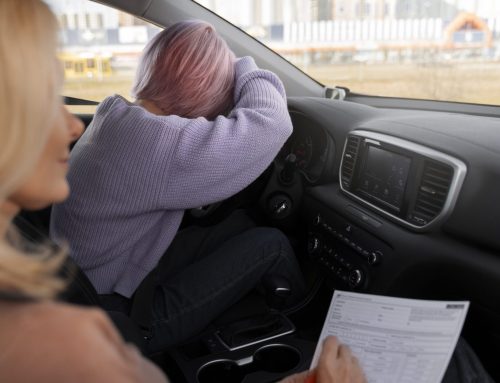Road safety is a cornerstone of a civilized society, and one essential aspect, especially in the province of Ontario, is the requirement to pull over for emergency vehicles. This vital obligation can have severe consequences if ignored. In Ontario, the laws and regulations around this subject are both clear and strictly enforced, reflecting the commitment of the community to maintain order and safety on the roads.
The Consequences of Not Pulling Over for Emergency Vehicles in Ontario
Compliance with traffic laws is paramount for everyone’s safety in Ontario. When drivers fail to yield or pull over for emergency vehicles such as police cars, ambulances, or fire trucks, the consequences can be grave and far-reaching.
Understanding the Importance
Delayed Response
Failing to pull over for ambulance or other emergency vehicles can cause life-threatening delays. In a busy urban area like Toronto, this can be crucial, where mere seconds can be the difference between life and death.
Legal Repercussions
A ticket for not pulling over for an emergency vehicle in Ontario is a severe legal infraction, under the Highway Traffic Act. Penalties could be severe and can include substantial fines or other legal consequences.
Risk to Other Drivers
Non-compliance can create confusion and danger for other road users in the province’s bustling roadways, leading to potential accidents and disruptions.
The Bigger Picture in Ontario
Awareness of the importance of yielding right-of-way to emergency vehicles extends beyond the individual to community safety in cities such as Ottawa, Hamilton, and throughout the province. This communal understanding forms the backbone of an organized society where laws are respected and followed.
Yielding to Emergency Vehicles: Ensuring Public Safety in Ontario
When you pull over for emergency vehicles in Ontario, you are contributing to the larger picture of public safety. The significance of this act cannot be overstated, as it provides a clear path for emergency responders to reach their destinations promptly.
Moral and Legal Obligation in Ontario
Saving Lives
Your prompt response can mean the difference between life and death in critical situations, emphasizing the human aspect of this legal requirement.
Preventing Accidents
Clearing the way helps avoid accidents caused by emergency vehicles rushing to help on Ontario’s roads, ensuring that help reaches those in need without additional mishaps.
Civic Duty
All Ontarians must cooperate to ensure the smooth functioning of emergency services. It is a societal responsibility that reflects the values and principles of the community.
Public Awareness in Ontario
Education and awareness about these laws are critical for a safe driving environment in cities like Mississauga and beyond. Campaigns, training, and public information sharing ensure that all residents are well-informed.
Emergency Vehicle Right-of-Way Laws in Ontario
Ontario has specific laws about when and how to pull over for emergency vehicles. Adherence to these laws is essential for the smooth functioning of the entire system.
Definition and Purpose
Emergency vehicle right-of-way laws define the rules and responsibilities of drivers when encountering emergency vehicles using lights and sirens. The purpose of these laws is to provide clear and unobstructed access for emergency vehicles, facilitating a quick response to urgent situations.
Obligations of Drivers
In Ontario, drivers are required to pull over to the right-hand side of the road as soon as it is safe to do so and come to a complete stop when they hear sirens or see flashing lights from an emergency vehicle. They must remain stopped until the emergency vehicle has passed.
Penalties for Failing to Pull Over for Emergency Vehicles in Ontario
Failure to yield in Ontario can lead to harsh penalties, reflecting the severity of the act. It is treated as a significant infraction, and the punishment is designed to deter future non-compliance.
Fines
The monetary penalty for failing to yield to an emergency vehicle can range from a minimum of $400 to a maximum amount of $2000, depending on the severity of the infraction. The fines can be substantial and are aimed at deterring drivers from committing this violation.
Demerit Points
In addition to fines, drivers may also be assessed 3 demerit points on their driving record. Accumulating demerit points can lead to further consequences, such as increased insurance premiums and even license suspension in repeated cases.
Court Appearances
For severe or repeated violations, drivers may be required to appear in court. A court appearance can lead to increased penalties, potential license suspension, and even imprisonment in extreme cases.
Impact on Insurance Premiums
A conviction for failing to yield to an emergency vehicle may also affect a driver’s insurance premiums. Insurance companies may view this infraction as a sign of high risk, leading to increased costs for coverage.
Impact on Driving Record
A conviction will remain on a driver’s record for a specified period, potentially affecting future employment opportunities, especially for those whose profession requires driving.
Risks and Hazards of Ignoring Emergency Vehicle Signals in Ontario
Ignoring signals is not just illegal but dangerous:
- Increased Risk of Collisions: Accidents may occur as emergency vehicles try to navigate around non-compliant vehicles on Ontario’s roads. The ripple effect can create further delays and additional accidents.
- Obstruction of Response: Delays can have dire consequences for those needing urgent help in cities like Brampton, where traffic is dense, and prompt response is crucial.
Emergency Vehicle Signals: Sirens, Lights, and Their Meanings in Ontario
Emergency vehicle signals, comprising sirens and lights, are a vital part of traffic safety in Ontario. These signals convey critical information to other drivers and pedestrians, allowing emergency vehicles to move swiftly and safely through traffic to respond to emergencies. Understanding what these signals mean and how to respond is an essential aspect of being a responsible driver in Ontario.
1. Sirens
In Ontario, emergency vehicles use different types of sirens to indicate the urgency of their mission and the type of vehicle approaching. Recognizing these sirens is crucial for immediate and appropriate action.
a) Wail Siren
The wail siren is a continuous rise and fall in tone and is commonly used by police, fire trucks, and ambulances to signal urgency.
b) Yelp Siren
A faster version of the wail, the yelp siren indicates an increased level of urgency. Drivers hearing this should act swiftly to clear the path.
c) Air Horn
A distinct, loud blast, typically used by fire trucks, serves as a secondary warning, especially in heavy traffic or when other warnings may not be sufficient.
2. Lights
Emergency vehicles in Ontario also utilize various lights to signal their presence and needs. Understanding these lights is key to proper response.
a) Red Lights
Red flashing lights are used primarily by fire trucks, ambulances, and police vehicles, signaling the need for immediate clearance from the road.
b) Blue Lights
Blue lights are often associated with law enforcement in Ontario, indicating a police vehicle’s approach. Snow removal vehicles may also use blue flashing lights.
c) White or Clear Lights
Often used in conjunction with red or blue lights, these enhance visibility and convey urgency.
d) Green Lights
In some instances, green lights are used by volunteer firefighters to signal their status and request right-of-way.
Impacts of Not Pulling Over: Delays and Consequences in Ontario
The failure to pull over for emergency vehicles in Ontario can have broader impacts that go beyond individual legal penalties.
Personal Legal Consequences in Ontario
Legal Penalties
A ticket for not pulling over for an emergency vehicle in Ontario might include fines, demerit points, or court appearances, reflecting the legal gravity of the offense.
Insurance Implications
Premiums may rise if you’re found guilty in Ontario’s legal system, providing an economic incentive for compliance.
Societal Consequences in Ontario
Public Safety
Non-compliance affects overall safety and community trust throughout Ontario. A collective commitment to following the law ensures a secure environment.
Reputation Damage
Your driving record might suffer long-term effects in the province, leading to challenges in your personal and professional life.
Reach Out to Traffic Paralegal Services in Ontario
If you have received a ticket for failing to pull over for emergency vehicles in Ontario, our specialized team at Traffic Paralegal Services is here to help. We are extremely well versed in the Provincial Offences Act and Highway Traffic Act in Ontario and can assist you in challenging these charges. Our expertise and deep understanding of the law will guide you through the legal process and help you navigate the complexities involved.
In Conclusion
Pulling over for emergency vehicles in Ontario is an essential legal and moral obligation. Understanding the laws, recognizing signals, and realizing the broader societal impacts specific to Ontario are vital. We, as responsible citizens in Ontario, must collectively contribute to ensuring a safer and more responsive driving environment. Failure to do so not only impacts us individually but has far-reaching consequences for our entire community in Ontario. Make sure to follow these guidelines to ensure that you are a responsible and compliant driver in Ontario, contributing positively to public safety. Your actions on the road reflect your commitment to the well-being of your community, and adherence to these laws is a mark of a responsible and engaged citizen.







Leave A Comment
You must be logged in to post a comment.